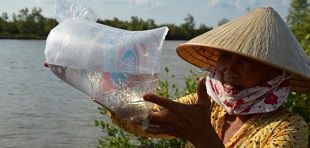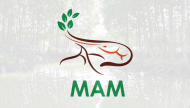Mangrove protection helps organic shrimp farming

While mangroves in the Mekong Delta are seriously threatened by shrimp farming, they are essential for sustainable shrimp production as well as climate change adaptation.
Today, the project “Scaling Up Mangrove Ecosystem-based Adaptation in the Mekong Delta” will be launched in Can Tho city, the heart of Mekong Delta in Vietnam. Key stakeholders will present and discuss the plans for scaling up mangrove protection and sustainable shrimp farming along the coastal areas of the Mekong Delta. The project supports the Government of Vietnam in reversing mangrove losses while strengthening the livelihoods of smallholder shrimp farmers with funding from the International Climate Initiative (IKI) of the German Environment Ministry (BMUB).
Over the past decades, more than half of Vietnam’s natural mangrove forests have been cleared, notably to accommodate shrimp ponds. This is a worrying trend, as healthy mangroves make important contributions to both climate change adaptation and mitigation.

In the previous first phase of the project (2013-2016), around 2,000 shrimp farmer households in Ca Mau province received training and technical assistance to meet organic certification standards, which require a 50% mangrove cover on each farm. In addition, the project worked with processing and export companies and government authorities to develop stable market mechanisms and create an enabling policy environment. Key achievements include the effective protection and restoration mangrove forests, enhanced smallholder livelihoods, and improved coastal protection against storms and sea level rise. For its significant contributions in the Ca Mau province, the project was awarded two Certificates of Merit from the Provincial People’s Committee between 2013 and 2015.
The current phase (2016-2020) aims to replicate and scale up the sustainable integrated mangrove-shrimp farming model along the coasts of Ca Mau, Ben Tre, and Tra Vinh provinces, which together contain half the mangroves in the Mekong Delta. Phase II seeks to reach 5,000 shrimp farmer households (accumulated), involve three processing companies, and mainstream Payments for Ecosystem Services (PES) on sustainable shrimp aquaculture into national and provincial development plans.
The project is implemented by SNV Netherlands Development Organisation and the International Union for Conservation of Nature and Natural Resources (IUCN). Today’s launch workshop will provide a space for local, regional and national stakeholders to reflect on past developments and discuss the way forward.

The link has been copied to the clipboard
Contact
IKI Office
Zukunft – Umwelt – Gesellschaft (ZUG) gGmbH
Stresemannstraße 69-71
10963 Berlin
Related Videos
Related Publications
-
 05/ 2022 | IKI Evaluation
05/ 2022 | IKI EvaluationScaling up mangrove EbA in the Mekong Delta
German with executive summary in English (PDF, 1 MB)










